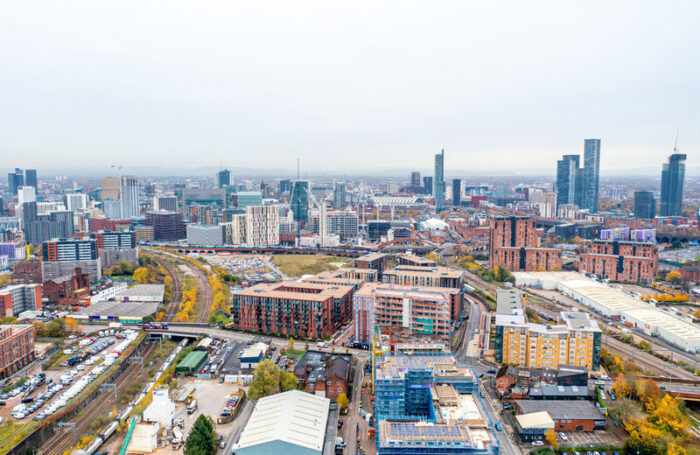To mark the start of COP27, we highlight the progress made to deliver our Environment Plan over the last year and look back at some of the key points from the fifth annual Greater Manchester Green Summit…
Green Summit 2022 was all about action and pace. From our speaker panels and exhibitors to our workshops and individual conversations between delegates, the event had a strong focus on how our city-region should accelerate action on its five-year environment plan and tackle the key environmental challenges facing it.
Our biggest attendance to date saw a vibrant mix of local authorities, businesses, policy makers, community groups, young people, industry and more feeding into the conversation.
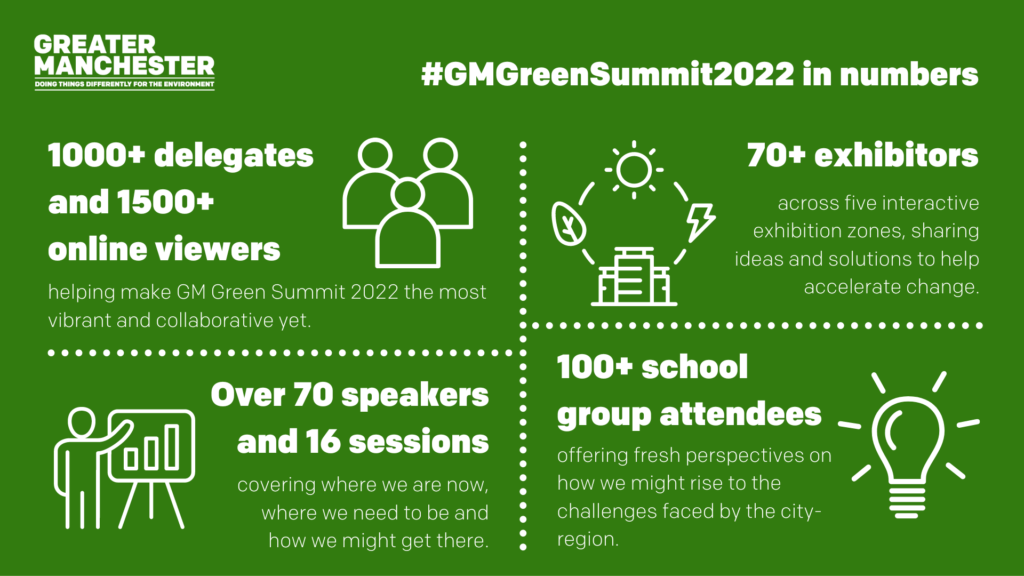
The case for accelerating action
The scale and urgency of the task that faces Greater Manchester was a key theme running through every panel, speech, workshop and conversation held at the Green Summit.
Opening the event, Andy Burnham, the Mayor of Greater Manchester, was clear in outlining where we are, emphasising the growing risk of the city-region missing its 2038 net zero target without a major change in Government direction. He used the Green Summit to call on Chancellor Jeremy Hunt, asking him to back Greater Manchester’s plans to build 30,000 net zero carbon homes for social rent, and retrofit thousands more, as a way of stimulating regional economic growth and creating around 85,000 new green jobs. You can read more about Andy’s challenge to Government on supporting Greater Manchester’s green push here.
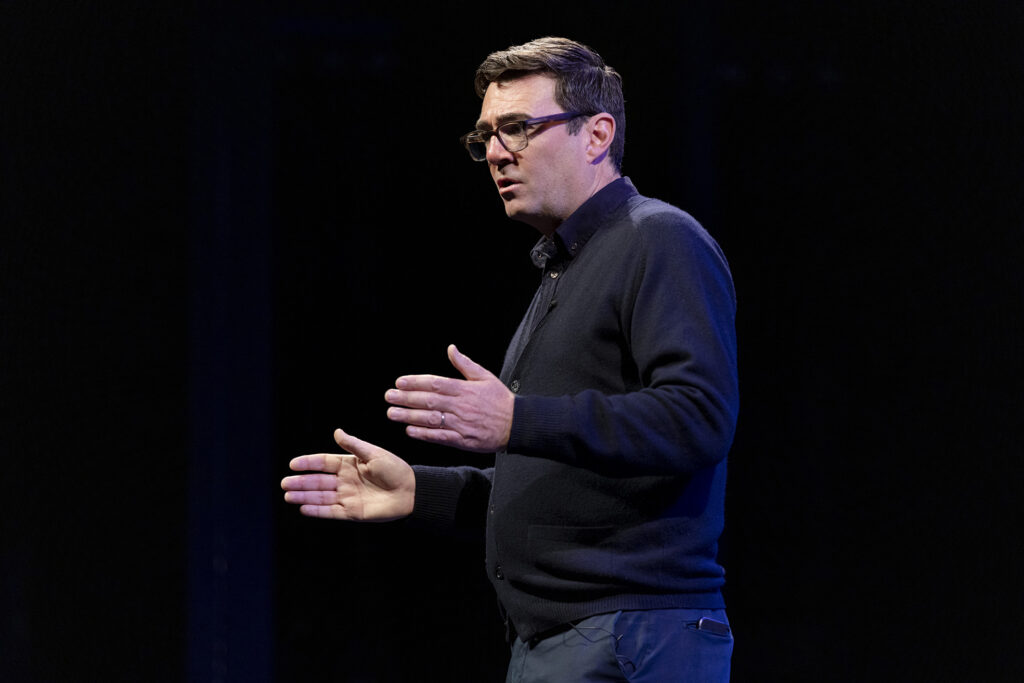
Hamra Hanif-Ali, Oldham Youth Mayor, stressed the importance of the green agenda to young people not just in Greater Manchester but across the UK and beyond, challenging young people to make their mark in a powerful address to delegates.
“The young people I’m representing today aren’t just young people,” she said. “They are Greater Manchester’s future residents, employees, CEOs, changemakers.”
“So don’t just listen to the speakers today. Involve yourself, network, work in partnership, work in partnership and collaborate. Let’s build a climate friendly GM and protect the future of young people. We don’t hold the power to make change. But you do, so listen to us.” This year, the Green Summit welcomed over 100 school group attendees to take part in the first official Green Summit School Climate Event, which ran alongside the main event and was hosted by Manchester Metropolitan University. Five bespoke workshops were held, which challenged attendees to come up with innovative solutions to the challenges outlined by the Mayor.
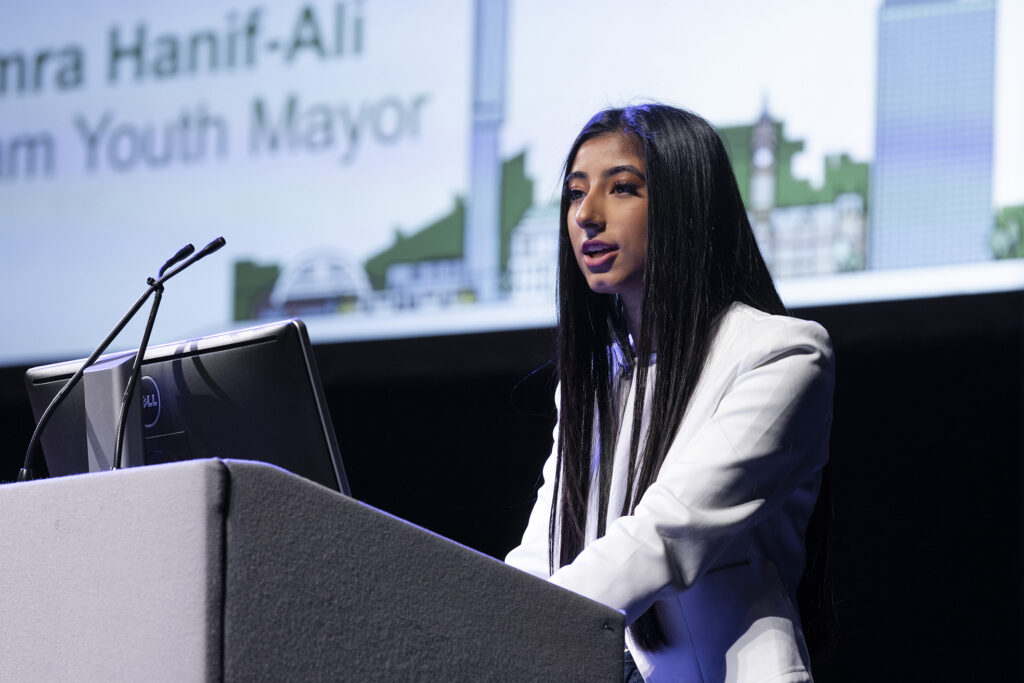
Councillor Martyn Cox, GMCA lead for the Green City Region, Waste & Recycling, reiterated the challenge. He highlighted the clear leadership role that the Combined Authority has and needs to play in achieving net zero, alongside the value of having all ten boroughs within Greater Manchester signed up to our vision, something that will be essential if we are to achieve our goals. If we are to achieve our 2038 target in a fair and equitable way, we need to restrict ourselves to 67Mt of CO2 emissions over the 20-year period from 2018-2038. “To date, we are not meeting those targets,” Cllr Cox said. “To get back on track, significant reductions in CO2 must happen as soon as possible.”
He went on to highlight how important reducing emissions from transport and domestic heating will be to meeting our target, stressing that they should be considered primary areas where progress needs to be made.
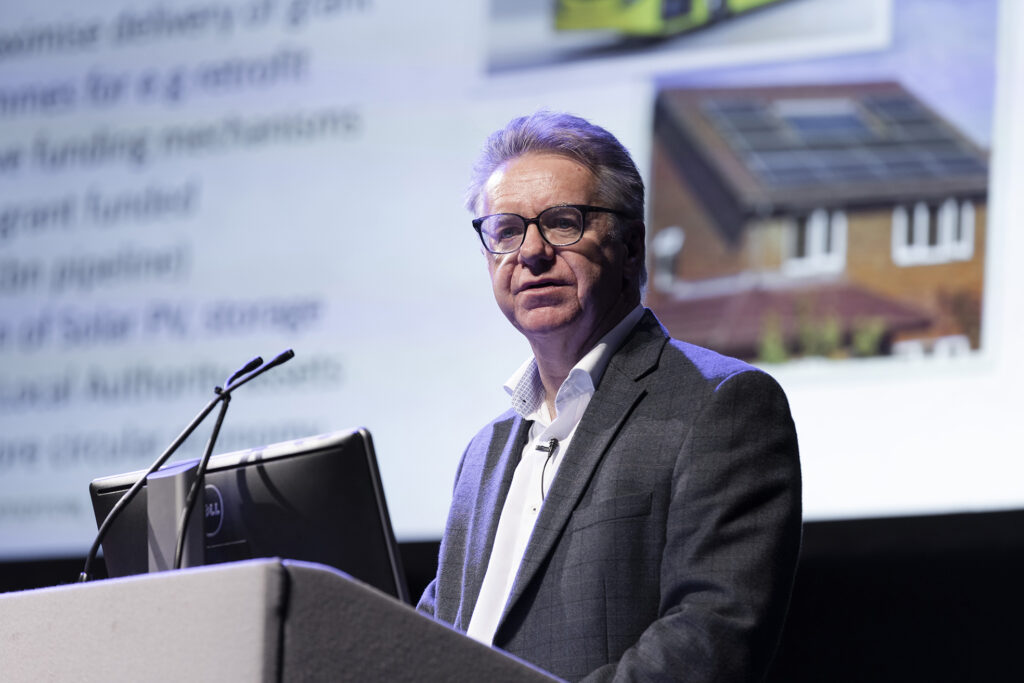
Carly McLachlan, Director of the Tyndall Centre, also emphasised the importance of pushing towards our target. It’s the insight of the Tyndall Centre that gives GM’s targets a scientific basis – viewing everything in that context will be essential to success going forward, Carly stressed, alongside other key messages including:
- Despite many ambitious programmes, limited progress in terms of emissions reduction has been made
- It’s really important to remember that the carbon budget should continue to drive our level of ambition
- We all need to be thinking more about how to scale things up quickly
- And we have to consider not just the ambitious projects we are pursuing but also the factors working against us – how are we embedding our goals across everything we do?
All in all, the clear message from the Green Summit was that everyone needs to be involved in change – and they need to be actively pushing carbon reduction measures forward now.
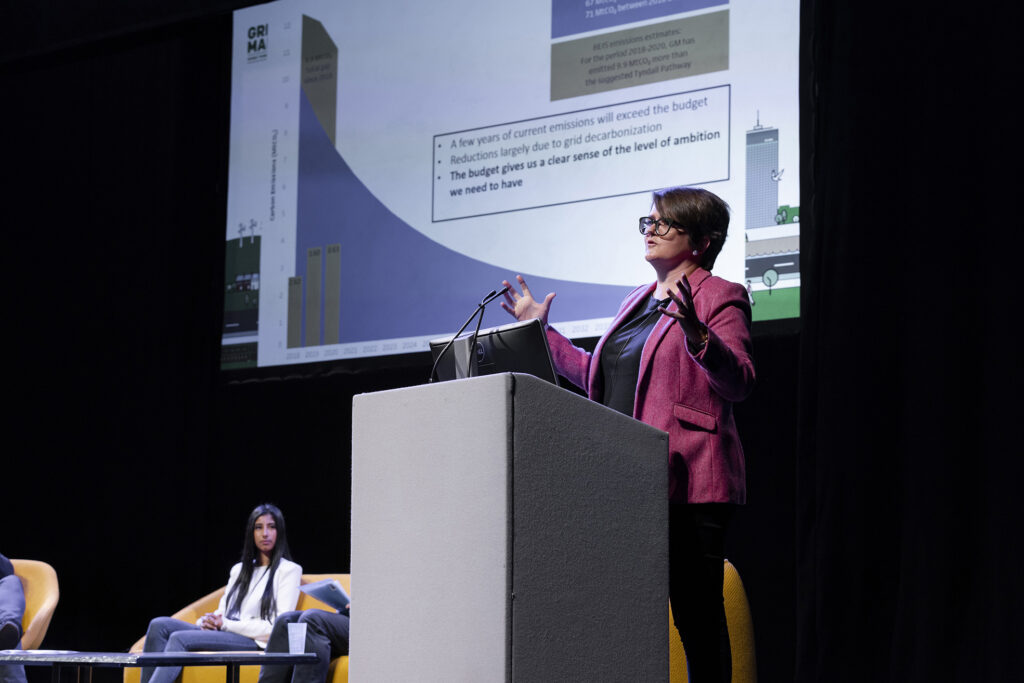
So what are we doing about it?
The Summit saw several key announcements being made across the agenda –from the Mayor announcing the 21 successful bidders of round 1 of the Green Spaces Fund to the formation of a new Green Energy Task Force for the GM and Liverpool city-regions, there were plenty of big takeaways on the day. The event also saw updates on key projects and collaborations already in the works, all pushing to deliver the aims of our five-year environment plan.
Highlights included:
- Greater Manchester has become the first city-region in the country to produce and adopt Local Area Energy Plans
- Through £47m from the Green Homes Grant and Social Housing Decarbonisation Fund, we have supported thousands of people to take action to decarbonise their homes, making them better insulated, less draughty, and heated sustainably. GM managed programmes have completed the retrofit of over 2500 resident homes and aim to complete the retrofit of 4000 homes by March 2023 One of five cities working with Dept BEIS on the City Deep Decarbonisation Programme to establish propositions for the rapid decarbonisation of heat.
- As part of the Public Sector Decarbonisation Scheme Phase 1, Greater Manchester has invested £77.1m in retrofit and low carbon energy generation for 200 public buildings. This is the largest programme of activity funded via the Public Sector Decarbonisation Scheme
- Bee Net Zero, a collaborative Greater Manchester programme to support organisations on their journey to becoming net zero, has been launched to make Greater Manchester the easiest place for businesses to be net zero carbon
- We launched the Go Neutral Smart Energy framework, analysing 4000 sites across GM for low carbon energy generation, storage and EV charging, a key part of Greater Manchester’s public sector work to decarbonise its estate and create a smart energy system
- The Trafford Green Hydrogen Park has received planning permission for will potentially be the largest green hydrogen production facility in the UK
- City of Trees and GMCA have secured £300,000 of funding from Defra from the Woodland Creation Accelerator Fund to accelerate tree planting across Greater Manchester. This will help us bring the benefits of trees and woodlands to more people across the city-region by building capacity locally to identify and bring forward the sites where the most benefits will be realised
- Greater Manchester has become the first major conurbation outside London to cap bus fares as part of our plan to revolutionise travel across the city-region. We are seeking a minimum 33% zero-emission bus fleet by 2027, with a fully electrified fleet by 2032
- To help achieve this, an order of 50 new double-deck electric buses has been placed for operation from Sept 2023, with around 300 more electric buses to be delivered from 2024 through to 2027
- GM has 108 cycling and walking schemes with a total value of more than £500 million in the development pipeline, with 100km of new cycling infrastructure installed so far. In addition, the Bike Hire Scheme is currently operating with 220 bikes across 41 stations and is awaiting approval on 6 final stations; the Cargo Bike pilot has 23 e-cargo bikes operational
- The last of 27 new Metrolink trams have arrived as part of £72m network investment
You can read more about how GM is delivering on its five-year environment plan here.
Making things happen
The event showcased a wide and varied range of approaches and technology that can help people from all backgrounds in Greater Manchester adapt at speed – whether you represent businesses, industry, policy makers or just you as an individual resident of the city-region, there are ways you can be accelerating action from now. The exhibition saw organisations talking about transport, the natural environment, buildings, energy, skills, waste management, sustainable lifestyles and more, all pushing better ways of doing things. You can see the full list of exhibitors from the event and what they covered in our event programme here.
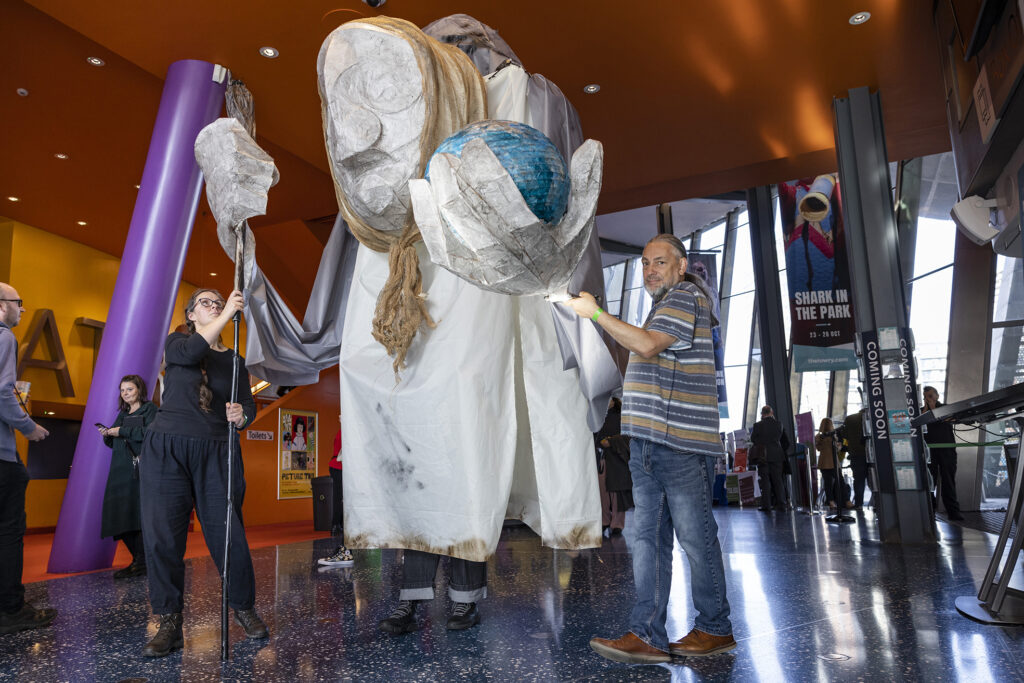



The view from the Summit
We were really lucky to have a great line up of speakers, exhibitors, headline sponsors and official partners for Green Summit 2022, helping make it the best one yet.
Vernon Everitt, Transport Commissioner for Greater Manchester, highlighted the impact that transport has – not just on carbon emissions, but also on the ability of people in the city-region to get on in life. “We want to give car users a decent, affordable alternative,” Vernon said. “The region is growing faster than most other regions of the country and a third of the people in Greater Manchester don’t have access to a car. We know that transport is an enabler of housing, jobs, social inclusion, and we also know that about a third of the carbon emissions in the region are transport based. So there’s a lot of work to be done on the transport system itself.”
Transport for Greater Manchester’s Get On Board campaign is helping make inroads in this, Vernon stressed, convincing people to make use of alternative modes of transport.
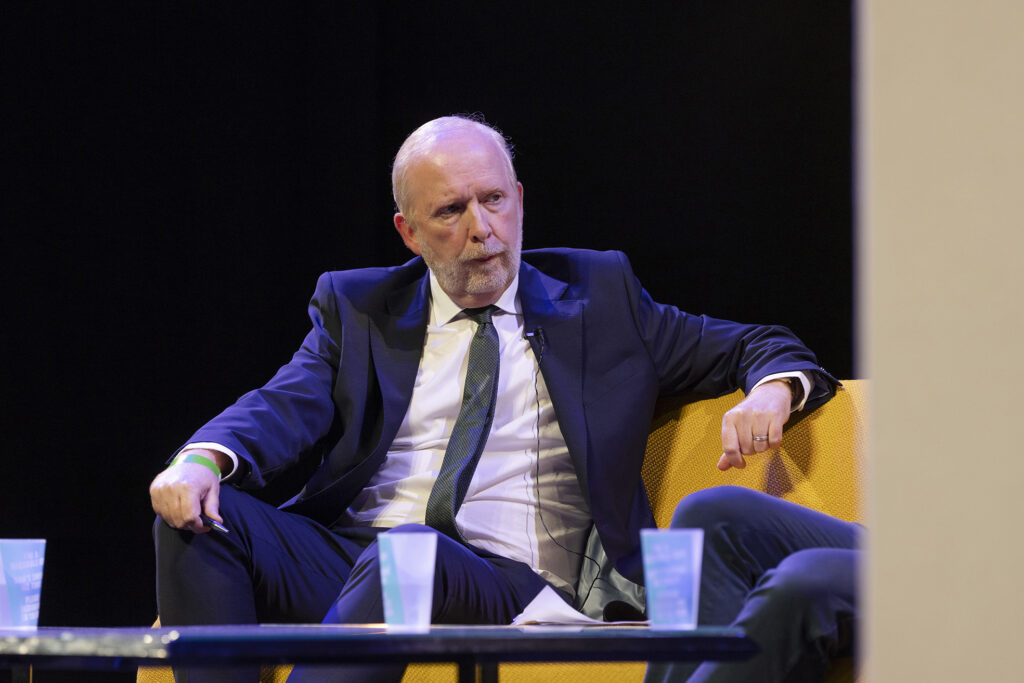
Decarbonisation of heat in homes was another key theme, and whilst there was an acknowledgement that initiatives are in progress to help push low carbon interventions forward, there are still clear barriers to be addressed. Emma Harvey, Director at the Green Finance Institute, shone a light on some of the barriers to progress that are preventing adoption at speed. “From a buildings perspective, as we’ve seen with the cost-of-living crisis energy is one of the largest expenditures we all face – alongside accounting for around 25% of our emissions.”
Consumer buy-in and access to finance are often key barrier, Emma said. Whilst 9 out of 10 people think energy efficiency is important, they also think it’s disruptive, expensive and a hassle. So there needs to be a clear policy direction and a clear enabling environment for people to want to decarbonise – that in turn will give the finance sector the confidence to innovate products that will help homeowners to decarbonise. Once again, collaboration will be key.
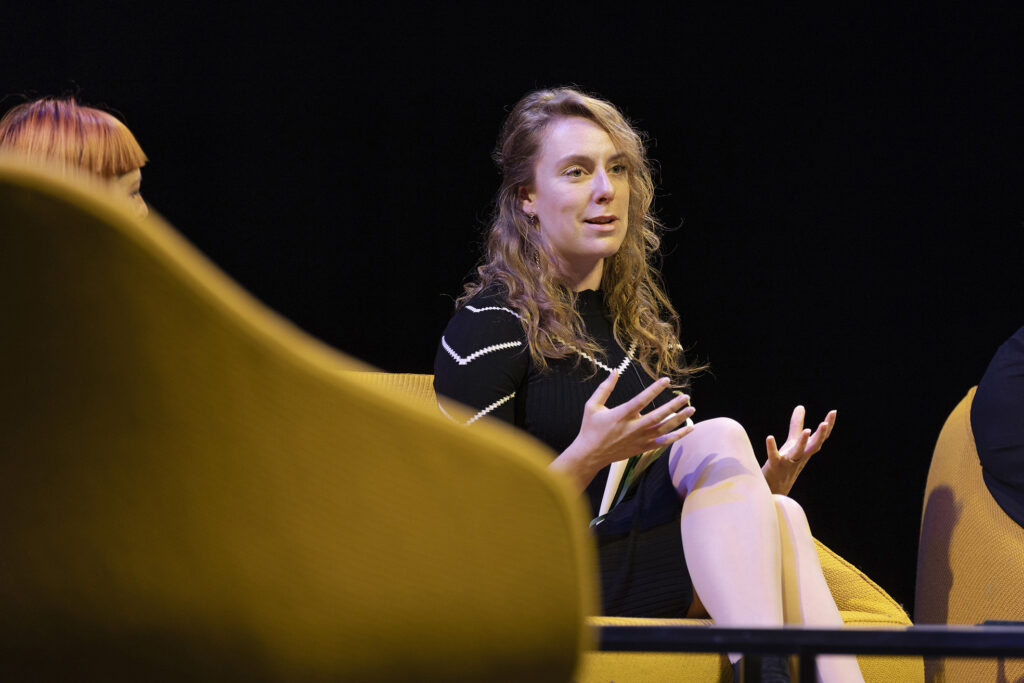
Helen Boyle, Head of Regional Development at Green Summit official partner Cadent, spoke about the importance of low carbon energy at the event and offered her thoughts on the day. She said: “As first time sponsors it was great to see so many people attend this year’s Green Summit and witness some clear key themes from the day around collaboration, whole system approach and we all need to work harder and faster to meet our net zero goals.
“At Cadent we are leading the introduction of hydrogen as a key player in the journey to net zero. Hydrogen is a fundamental part of our clean energy revolution. It’s a key future fuel for heating homes and powering vehicles including planes, heavy haulage, ships, trucks and trains.
“We are proud to be accelerating action by working alongside key regional stakeholders to ensure plans are shaped with their needs in mind. That’s why we’re continuing to support the Greater Manchester Combined Authority make their bold net zero goals a reality by 2038.”
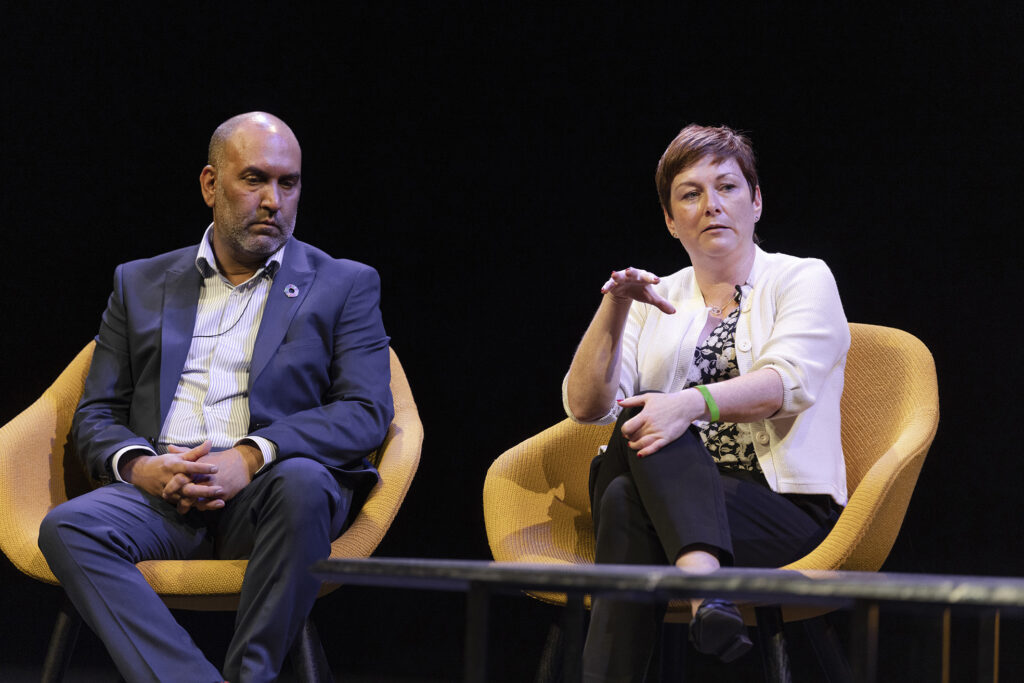
Biodiversity was another hot topic on the day, and Jo Holden, Sustainability & ESG Director at Peel L&P, was pleased to see the buy in from attendees. “In terms of the natural environment, it is clear there is a great willingness from Greater Manchester stakeholders to work together to enhance the overall biodiversity of the region,” she said. “For the property sector specifically, the challenge is for all developers, big and small, to understand how they are going to build-in biodiversity to future developments ahead of new Biodiversity Net Gain regulations in 2023. Post-pandemic, biodiversity is no longer a nice to have – it’s an essential part of placemaking to benefit the health and wellbeing of communities and the resilience of nature to climate-related pressures.
“We were pleased announce at the fifth GM Green Summit our commitment to creating our first biodiversity bank. This project will involve habitat enhancements, including grassland and woodland, across a 35-hectare, ex-landfill site in Boothstown, Salford. This project sits alongside our commitment to putting more nature into new residential communities, through our homebuilding arm Northstone UK, and other projects such as a Ten-Year Biodiversity Action Plan for MediaCity in Salford.”
We are often told that we all have a role to play in the push to reach net zero, and the role of the individual was covered by Dr Adam Read, External Affairs Director at Suez recycling and recovery UK.
“It needs to be about going beyond recycling,” Adam said. We should be reducing, reusing, repairing, doing more with what we have instead of defaulting to the new. “But we’re not enabling these options to be as easy to access as they can be, compared to curb side recycling collection. What’s stopping us from doing the obvious stuff quicker?”
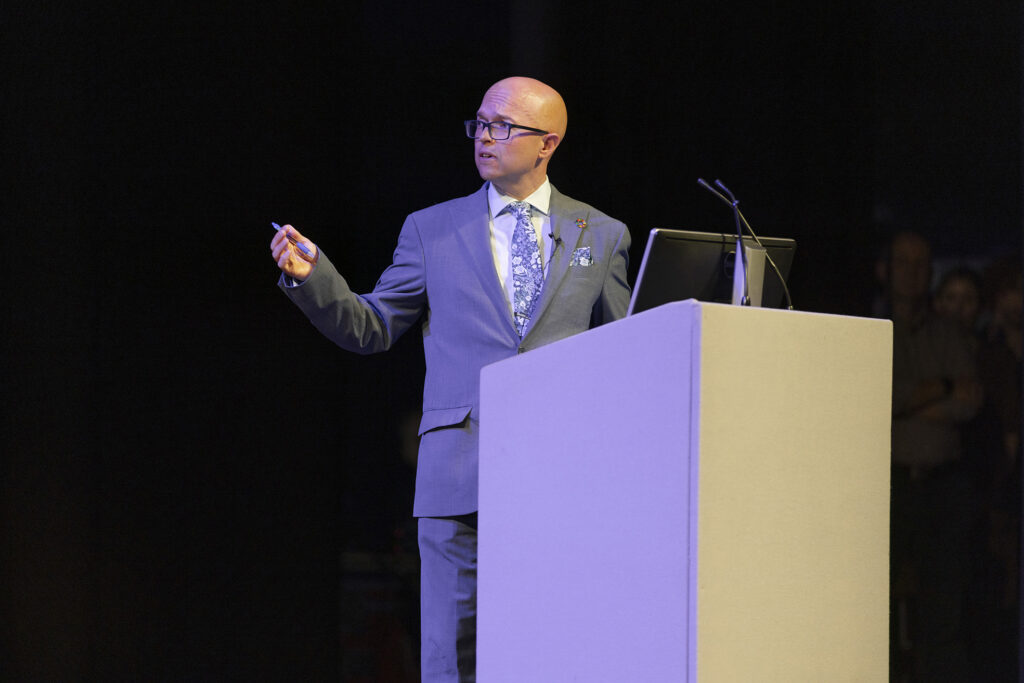
Corin Bell, Director at Open Kitchen MCR, also highlighted trust as a key issue when it comes to getting individuals to get behind Greater Manchester’s drive to a more sustainable future. “There are a lot of really bad companies out there that are doing a brilliant job of greenwashing, because they have massive budgets,” she said. “There are then a lot of really great companies doing everything right, but they don’t have an advertising budget.” The combination is damaging, Corin suggested, as it leads to both consumer confusion and lack of trust in key terms like ‘net zero’.

Water security is an important ever-present on the environmental agenda, so Jonathan Dobson, Sustainability Strategy Manager at United Utilities, was keen to highlight the risks and opportunities they discussed with delegates. “As always with the GM Green Summit it was really good to see so many organisations who are doing great things in and around greater Manchester. Many thanks to those who took the time to speak to the team on the United Utilities stand and give us your views on the environmental challenges facing the region and the risk and opportunities ahead.
“Having taken a quick look at some of the responses received it is evident that many individuals feel the current cost of living crisis poses a significant challenge for their sector, with particular concern surrounding rising bills, energy costs and levels of deprivation across the region. The climate crisis was noted by many people, highlighting their concern over reducing greenhouse gas emissions whilst balancing business expansion. Finally, sustainability was repeatedly mentioned with an emphasis on being more green and using organic products where possible.”
Jonathan detailed how in terms of risks and opportunities from a water perspective, the responses fell into the three main areas:
-
- Too little – Risks highlighted repeatedly included water security, with water demand, scarcity and conservation being mentioned.
-
- Too much – Flooding with an emphasis on flood risk resilience, the impact of flooding and increased heavy downpours.
-
- Quality of rivers – Issues such as sewage spills and associated public health problems, plastics and litter in rivers, chemical contamination and risks for wildlife all being highlighted.
“These views and insights into what stakeholders care about are really useful in shaping how we address these challenges over the long term,” Jonathan said. “We share concern about these issues, and the Green Summit provided a great chance to start tackling these real challenges together.”
Following on from the Green Summit School Climate Event, the need to engage young people was another key theme throughout the Green Summit, and Alex Edwards, Sustainability Director at Bruntwood, highlighted the importance of youth involvement if we are to meet our goals in the future. “My biggest takeaway was the need to educate more young people on climate change and the desperate requirement to address the green industry skills gap; we all know the opportunity the green economy represents, but without the skills this opportunity will sadly pass us by.” You can read more of Alex’s reflections from the day in his great blog here.
Bringing the Green Summit to a close, the Mayor had an in-conversation session with the brilliant Jason Williams, also known as the Cloud Gardener. Jason and the Mayor had an honest discussion about the impact that the environment can have on both physical and mental health, with Jason outlined his aim of inspiring a new generation of urban gardener, encouraging people to make the most of whatever space they have access to see the benefits to urban wildlife and biodiversity but also mental health.
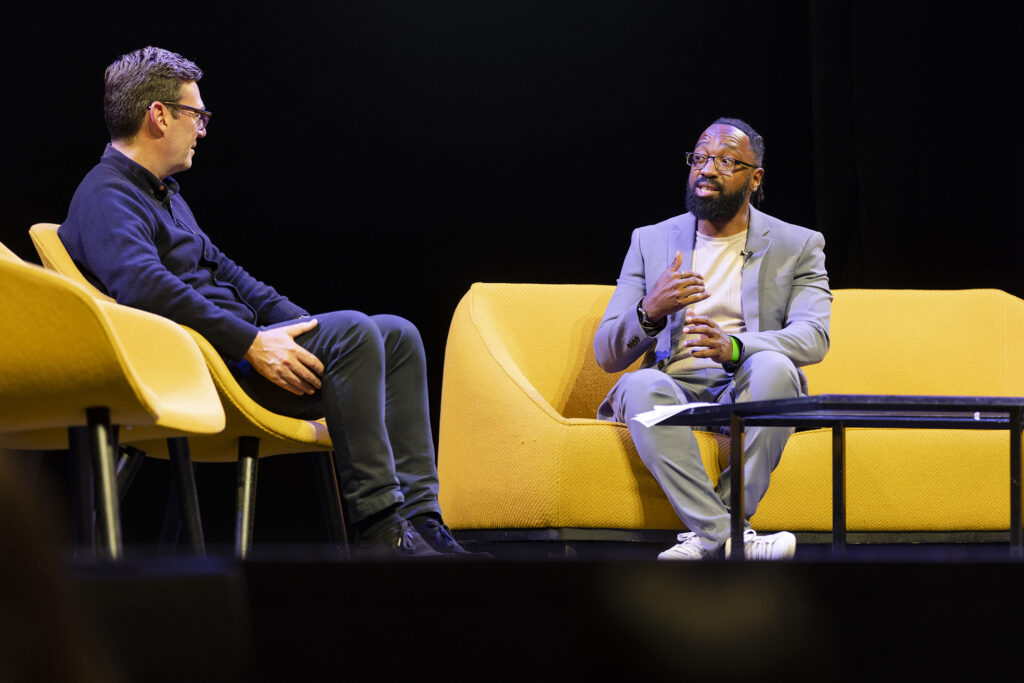
Gathering your input on our five-year environment plan
As highlighted above, reaching our ambitious 2038 goal will require action from everyone in Greater Manchester. So it’s vital that everyone has a say in how they want to see change happen – that’s why we sought input from attendees on how action against our five-year environment plan should be accelerated, as well as gathering their thoughts on what the next iteration of the plan – due in 2024 – should focus on.
We’ve already had loads of great input, but we want more! Regardless as to if you attended the Summit or not, if you’ve got ideas and reflections you can feed in via our surveys here:
Watch the full event livestream recording
If you want to understand more of what was covered on the day or want to revisit any key sessions, you can still view our recording of the main sessions below. Alongside the live stream you can also view the full presentation slides from the event here.
Our sponsors
We wanted to give a final big thank you to all our headline sponsors and official for helping make the Greater Manchester Green Summit possible.
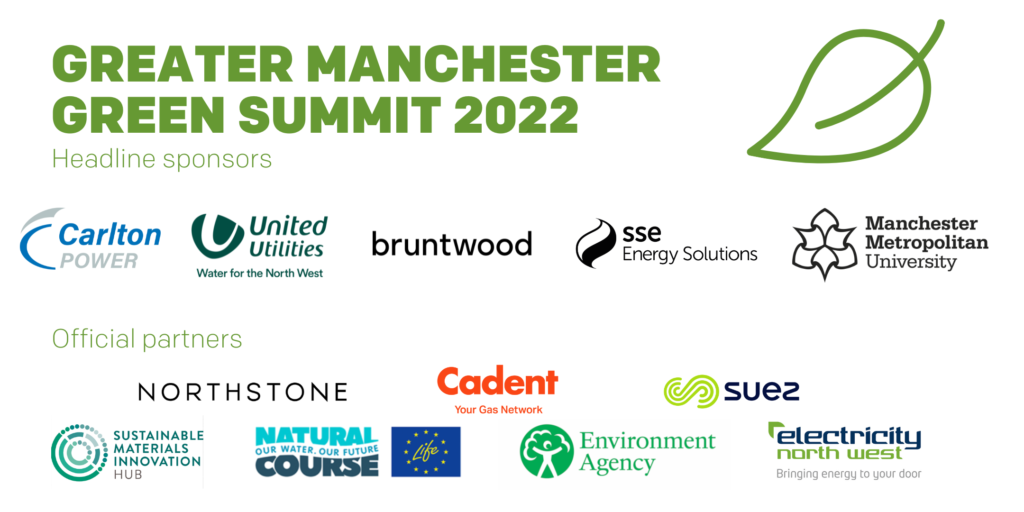
Stay in touch
We will be running further events in 2023 to help us build the next iteration of our environment plan – to find out more, sign up to receive our quarterly update on GM Green City news direct to your inbox, full of the latest progress, opportunities to get involved and news about GM Green Summit 2023: click here to sign up.
